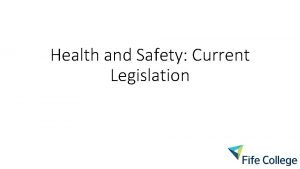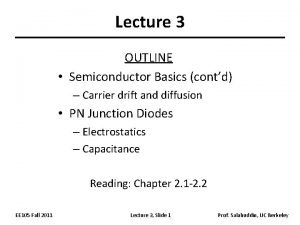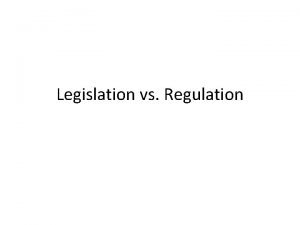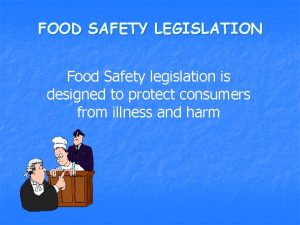Health and Safety Current Legislation Health and Safety









- Slides: 9

Health and Safety: Current Legislation

Health and Safety at Work Act (HASWA) 1974 • For straightforward guidance on how to comply with the health and safety law, go to The basics for your business. • The Health and Safety at Work etc Act 1974 is the primary piece of legislation covering occupational health and safety in Great Britain. It’s sometimes referred to as HSWA, the HSW Act, the 1974 Act or HASAWA. • It sets out the general duties which: • employers have towards employees and members of the public • employees have to themselves and to each other • certain self-employed have towards themselves and others

Health and Safety at Work Act (HASWA) 1974 • You can read the Health and Safety at Work etc Act 1974 in full on legislation. gov. uk. • You can find out about health and safety law in our guide Health and safety at work: criminal and civil law.

Responsibilities of The Employer and Employee • Employers’ responsibilities • • • Ensure work area has been assessed and risks reduced Provide information and training Provide adjustable seating Ensure screens are both adjustable and able to tilt Ensure employees are allowed breaks or time away from their workstation Provide eye examinations if requested.

Responsibilities of The Employer and Employee • Employees’ responsibilities • Take care to avoid hazards in the workplace and advise their employers of any concerns • Make personal adjustments to seating and screens to ensure correct posture and comfort • Ensure training sessions are attended and keep up-to-date on changes to Health and Safety regulations

Health and Safety (Display Screen Equipment) Regulations 1992 • With more and more businesses using ICT in the workplace, this regulation was created to try and minimise the risks associated with the use of display screen equipment – sometimes known also as Visual Display Units (VDUs or monitors). • Some of these potential risks could be: • • Eye strain Back pain/ache Repetitive strain injury (RSI) headaches

Health and Safety (Display Screen Equipment) Regulations 1992 • What is repetitive strain injury (RSI)? • This is a term used to describe pain in the muscles, tendons and nerves. It is often caused by tasks of a repetitive nature such as using a keyboard, by poor posture or by incorrect positioning of seating.

Health and Safety (First Aid) Regulations 1981 “The Health and Safety (First Aid) Regulations 1981 require employers to provide adequate and appropriate equipment, facilities and personnel to ensure their employees receive immediate attention if they are injured or taken ill at work. These Regulations apply to all workplaces including those with less than five employees and to the self-employed. ” Taken from HSE. go. uk

Fire Precautions (Places of Work) Regulations 1995 Employers are required to have procedures in place to meet the requirements of this legislation. • Employers are required to: • Adequately assess any fire risks to the organisation and to regularly re-assess these risks • Provide fire-fighting equipment and to ensure it is maintained through regular checks • Install and use warning systems • Train staff in fire evacuation procedures • Ensure that fire routes and doors are clearly labelled and unobstructed at all times • Carry out regular drills and tests of the warning systems.
 Health and safety legislation
Health and safety legislation National policy and legislation related to child health
National policy and legislation related to child health A balanced delta connected load having an impedance 20-j15
A balanced delta connected load having an impedance 20-j15 Line current and phase current
Line current and phase current Drift current and diffusion current
Drift current and diffusion current Ac theory 3 lesson 4
Ac theory 3 lesson 4 Drift current
Drift current Drift current and diffusion current
Drift current and diffusion current Balanced y-y connection
Balanced y-y connection Infineon
Infineon

















